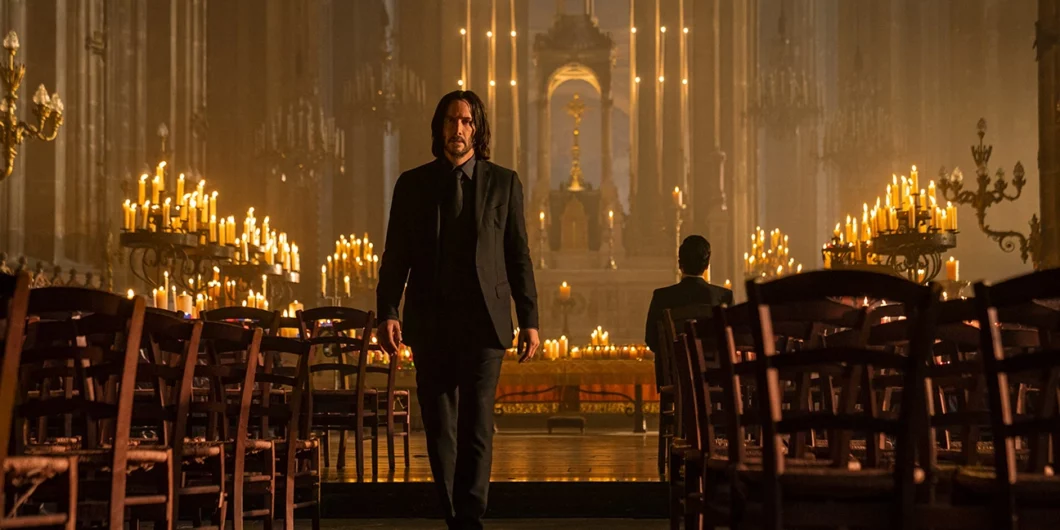Why are reforms that empower the people so often denounced as "undemocratic"?
A Mythology for Young Men
Keanu Reeves is a movie star with a reputation for decency and an unusual friendliness with ordinary people. He is also an action movie star, famous for The Matrix (1999). He is the man audiences want to see win because he looks like a good guy; accordingly, he doesn’t just cut an all-American figure, he seems to bear the burden of American loss of confidence, which audiences experience as increasingly brutal and often hopeless or pointless entertainments.
This is especially obvious in the even more action-packed franchise which returned him to stardom, John Wick (2014), which mixes martial arts with shootouts. Its fourth chapter has just been released to nearly universal applause and its largest audience yet. It earned more than $70 million in its opening weekend, remarkable for a movie that’s not about superheroes and which carries an R rating for violence, in a post-pandemic situation where movies aren’t as attractive to audiences.
Reeves is now almost 60 and he looks tired onscreen. Maybe the burdens are adding up and it’s harder to believe there’s an end of trouble in sight. He’s grown silent, too, uttering less than 400 words in this latest, almost three-hour-long movie—not quite a third of the review you’re reading. He has turned from the youthful, even innocent American of the ‘90s, looking to do the right thing, into a different kind of moral authority, a man of legendary experience looking for redemption, to set wrongs right before he meets his end.
The Naïve Audience and the Images of Violence
John Wick started back in 2014 with a moment of grief that recalls Mel Gibson in Lethal Weapon (1986). John’s wife dies of cancer, leaving him to feel empty, unable to save her, unable to love anymore. The images of beauty in his life–a puppy his wife had left him, his modernist house, his old Mustang—turn out only to attract criminals looking to rob him and the image of the luxurious American life for the middle-aged man thus becomes an added humiliation. This is what turns John into a figure of vengeance, a man to right the wrongs of our world. His misery makes us think of Hamlet’s complaint:
For who would bear the whips and scorns of time,
The oppressor’s wrong, the proud man’s contumely,
The pangs of despised love, the law’s delay,
The insolence of office and the spurns
That patient merit of the unworthy takes,
When he himself might his quietus make
With a bare bodkin?
Of course, suicide is un-American, and John instead turns to punishing the criminals, who turn out to be Russian mobsters—a reliable image of the cruel, despotic attack on American freedom in any number of action movies in our time. But John Wick is not a revenge movie and it’s not even a story of manly self-assertion. It’s instead about turning to mythology to deal with the confusions and dangers of our modern lives, which may not make sense and therefore might send especially the young men who make up the movie’s core audience to storytelling.
This is why we come to the flamboyantly choreographed violence of the series. John’s unjust suffering reveals that he is more than able to defend himself. He is scarier than the criminals, an infamous assassin in a secret world of assassins, with its complicated hierarchies and organizations, and a feeling of doom, of the inescapable claims the past makes on a man, whatever his prowess or daring. John’s double identity makes him a very attractive character precisely because it seems to put him beyond justice, living by the gun. But it also reveals that the concern with justice, preferring victims to perpetrators, the innocent to the criminal, is somehow connected with the anger of the young, which they cannot control and which we as a society fail to help them control. Instead, they turn to the movies for adequate teaching.
John returns to that world of crime that seems to bind together the richest and poorest, the business elites of the modern corporate economy who keep us at a distance and the underclass we stay away from. John stands for his audience, we middle-class people, and, following him, we learn about the origins of the desire for equal freedom in the democratic war on the old aristocracies which provide us our myths. Scene after scene, across four movies, the John Wick series takes viewers on a tour of world history as well as cinematic history, trying to bring out a universal ideal of honorable behavior in face of terrible injustice coming out of the presumption of the aristocrats, at the same time as it teaches the audience that yearning for comfort is both undignified and unreasonable—there is always some danger and it needs men to face it. Our fascination with splendor and glamour, the honorable and the cruel, makes the stories romantic yet dangerous. We are supposed to return to our own more egalitarian pieties once these ghosts are put behind us.
John Wick is so attractive to the audience, because in our time, individualism is no longer rugged and our urgent concern is not the education of the mind, but the education of character.
Accordingly, the movie takes us on a tour of the old, pre-democratic, pre-American world, its customs and costumes hinting of super-human beauty, of tragedy. John has to battle a Marquis in Paris, outside Sacre Coeur, who represents the highest authority in the world of assassins, after he assassinates the previous leader of that organization, called the High Table. John is chased by an old friend who has become corrupt, a blind Chinese swordsman played by Donnie Yen, the most famous martial arts actor in Hong Kong. John also has loyal friends, for example, a Japanese man, with the honor of a samurai and the criminal way of life of the yakuza, which makes for another elaborate action set piece in Osaka.
In short, it’s everything available in entertainment for boys over the last two or three generations, from James Bond to the computer games that have players practice their dexterity to provoke images of bloodshed. The past is conjured up because the present is boring, confused, and lacking in spiritedness, yet the best conjuring that our entertainment can do will leave the young as naïve as when they started looking for fantasies of violence, but less aware of the dissatisfaction that sends them searching for heroes.
It is only the conflict between the aristocratic and the democratic ideals that can articulate the longings of the boyish heart, satisfy the self-importance of the young, who are much likelier to deal with shame by throwing a tantrum than by reflecting on their neediness, and turn revenge into a desire for justice. By making up a story about a vast conspiracy of the ruthless rich, John Wick tries to broaden the angry vision into a concern for America as a whole, and by gathering the young men into an audience, it tries to turn private fantasies of revenge into a public statement about equal dignity. It’s an attempt to make cinematic art serve and ennoble democracy.
Rugged Individualism and Feeble Individualism
John Wick is an image of rugged American individualism, from his Mustang and gun to his silent demeanor. He is tempted by desperation, but he is not hopeless—he tends to think of existential concerns as problems to be solved, one encounter with an antagonist at a time. He is not a sophisticated fellow and he cannot boast much by way of self-knowledge. It is his ability to overcome the paralysis that recommends him to the audience. His martial prowess is only an image of his unconquerable heart. He is mortal, but cannot be cowed into submission.
He is so attractive to the audience, because in our time, individualism is no longer rugged and our urgent concern is not the education of the mind, but the education of character. Lack of self-control and self-confidence are somehow the correlatives of the increasingly technological upbringing of our children, who are disciplined by school with a view to college and career, at the price of any thought about their souls. The sometimes beautiful and often horrible violence we see in the movie is the spirited reaction to that servitude.
Computer games and movies are for ordinary young men. The more ambitious or self-regarding, the smarter and more romantic, take the feebleness much more personally and point to a much more serious problem, the belief that there’s nothing you can do in a world of health and safety regulations, HR political correctness, and woke despotism.
They also often like John Wick, but they turn to different entertainments, especially to social media, to acquire a reputation for ruggedness through clever displays of hysteria and the angry denunciations of our elites. This is what is called the online right-wing, which ranges from decent men driven mad by the impudence of progressive injustices to crazy people proclaiming every horror known to history for the same reason badly brought-up children repeat curse words they have heard but do not understand. They know how to get a rise out of respectable adults and they believe it’s the only way to get revenge for being abandoned or treated without respect.
Unfortunately, they are right that they have no way to gain self-respect through institutional work. That brings us to another aspect of the John Wick movies, which the ordinary viewer is not so interested in, the love of conspiracies. John has friends in secret places, men who would willingly kill and die for him, who know his secrets and trust him despite the indifference or hostility of the world. That’s perhaps the single most attractive aspect of the character and the one that makes him as aristocratic as his enigmatic opponents, as far beyond our ordinary way of life as the stylish imagery. I regret to end with a cliffhanger, but that desperate search for loyalty is another conversation about young men and spiritedness, which we might delay until the inevitable sequel.



